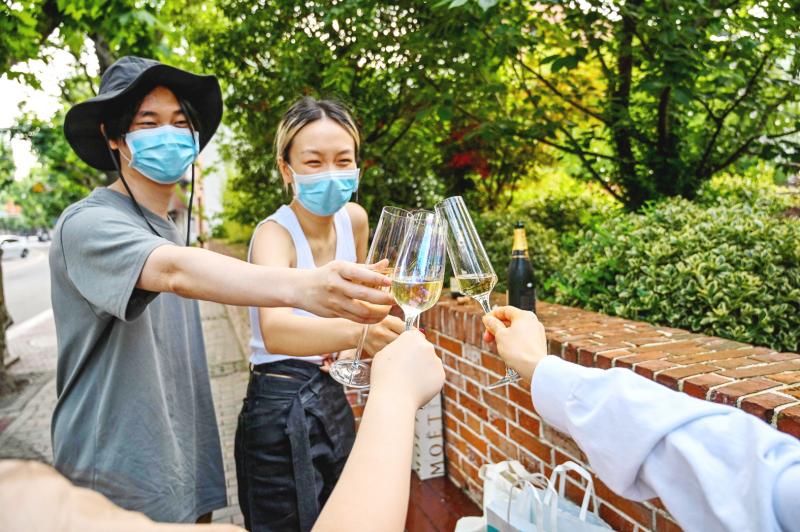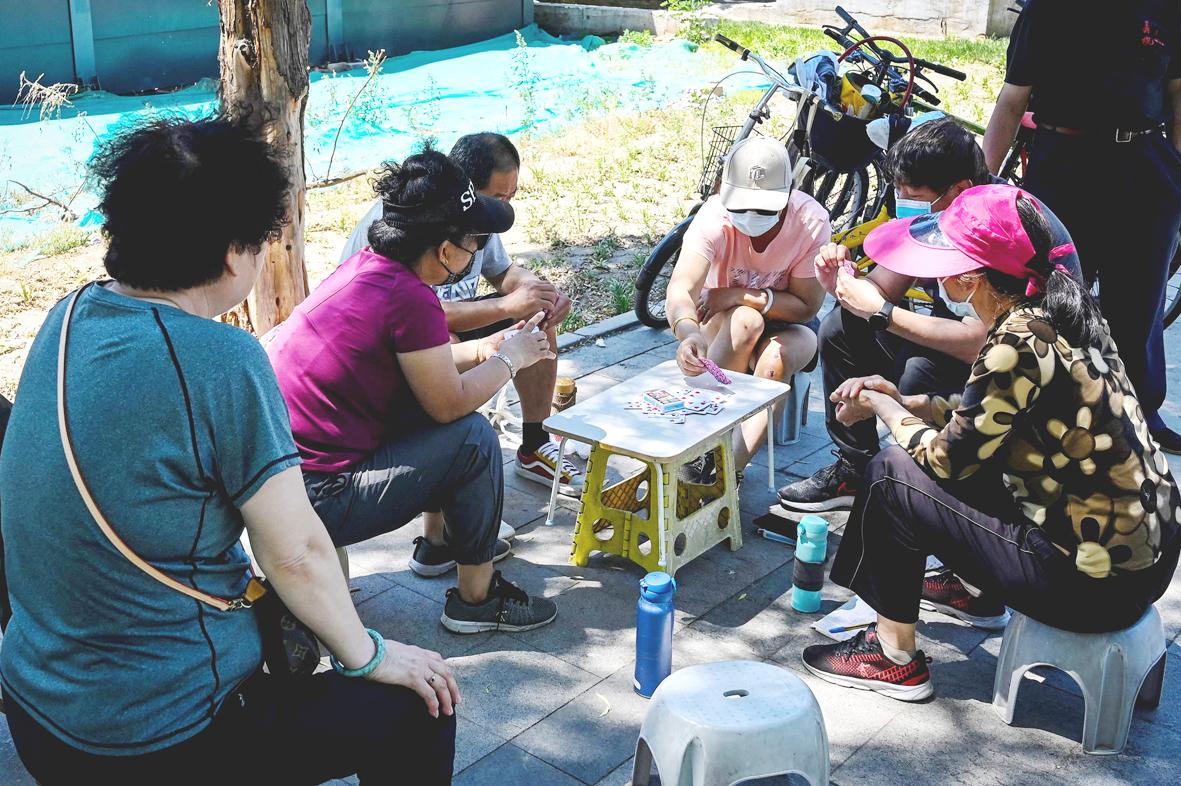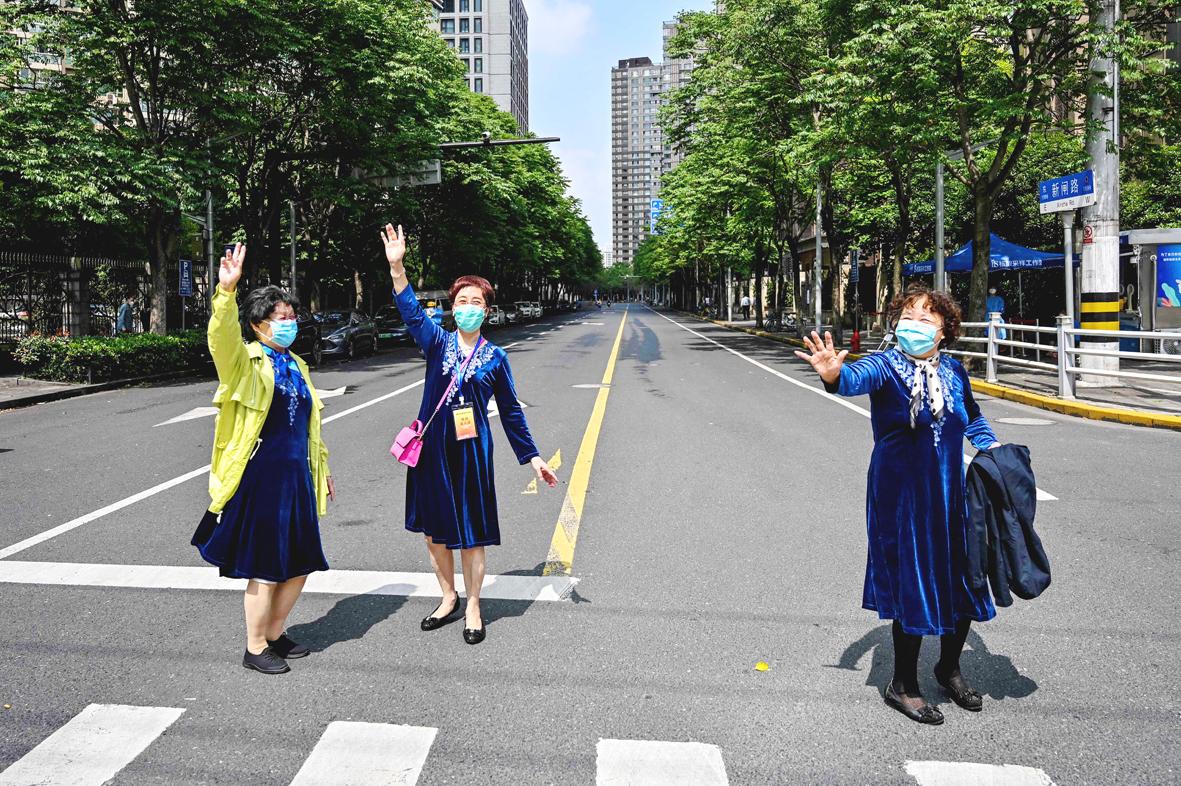Mothers hosting playdates near cordoned-off parks, mahjong maestros huddled in streets and youngsters slugging night-time beers on barricaded sidewalks — Beijingers are making the most of the small spaces available as China’s COVID-19 controls close in.
Meanwhile in Shanghai, a growing number of residents are being allowed to briefly venture outside as the city gradually eases out of an extended lockdown, celebrating their first hours outside in weeks with champagne and roadside picnics.
China is hitched to a zero-COVID policy that triggers mass lockdowns, routine tests and movement restrictions whenever infection clusters emerge — the last major economy to do so in a world now living with the coronavirus.

Photo: AFP
Beijing, a city of 22 million people, looked on in horror as Shanghai entered a slow-motion lockdown last month, with millions still under stay-at-home orders.
The capital has recorded just dozens of cases each day but has also gone quiet since the beginning of the month with schools closed and everyone — other than doctors and a few essential workers — told to work from home. Now the city is watching and waiting to see which way the virus trends.
Hundreds of thousands of people have been restricted to their homes, still well short of a full lockdown but enough to leave only the brave and the rebellious out on the streets of a pandemic-weary city.

Photo: AFP
“Everything is closed! Cinemas, museums ... football pitches,” said Eric Ma, a programmer sharing a few beers with friends around the Liangma River in downtown Beijing.
“It feels claustrophobic. We have to find creative ways to have fun.”
CAT-AND-MOUSE

Photo: AFP
Those, like Ma, who venture out face a cat-and-mouse game with police and city authorities enforcing strict virus rules and sealing off access to riverbanks and other gathering spots.
A large blue sign near the river captured the authorities’ approach: “Be patient to enjoy the sunshine when the pandemic ends.”
Still, dozens of people were seen jumping over the barricades or wriggling through police tape to go for a dip on a warm Monday afternoon.
A middle-aged man stood in the water singing an aria from a famous Peking Opera. Some brought folding chairs, tables and small gas stoves to cook outside.
Since restaurants have been shuttered, only allowing takeout, and many housing blocks not permitting visitors, people have started picnicking on pavements.
“The guards come from time to time and chase us away,” said Reiner Zhang, a fashion designer who had spread her picnic mat on a street corner near the Liangma River.
“But we don’t care. People are frustrated with pay cuts and layoffs and we need to meet and vent,” she said.
Parents sat on the riverbank, eating watermelon, while children paddled along the shallow edges of the river.
“We bring the children here for some exercise,” said Niu Honglin, pointing to her seven-year-old son bobbing up and down in the river with his floaters.
“With parks closed, there are no places to play, but children start throwing tantrums if they are stuck at home all day doing online lessons.”
BRIEF RELIEF IN SHANGHAI
Old neighborhoods in the heart of Beijing, normally bustling warrens filled with hawkers, tourists and rickshaw drivers, have also been closed. But a couple posed for wedding photos in front of the old drum tower on Monday, while on a nearby street retirees gathered to play mahjong, flouting strict social distancing rules.
“We come here after lunch every day, and play until the sun goes down,” said a retired municipal worker who only offered his last name Zao. “We’ve done it for years and the pandemic won’t stop us.”
In Shanghai, residents are slowly emerging from the other side of a lockdown during which millions were banned from stepping out of their homes.
The mood was festive in the central Jing’an district on Wednesday outside one apartment compound where residents were finally permitted to step outside — for only two hours —- after 55 days indoors.
A masked quartet of friends toasted their brief freedom with champagne, while a group of older women put on their Sunday best for a long-awaited stroll through the neighborhood.
A barber in protective gear gave customers haircuts in a makeshift roadside salon, as most hairdressers in the city remained shut.

Taiwan has next to no political engagement in Myanmar, either with the ruling military junta nor the dozens of armed groups who’ve in the last five years taken over around two-thirds of the nation’s territory in a sprawling, patchwork civil war. But early last month, the leader of one relatively minor Burmese revolutionary faction, General Nerdah Bomya, who is also an alleged war criminal, made a low key visit to Taipei, where he met with a member of President William Lai’s (賴清德) staff, a retired Taiwanese military official and several academics. “I feel like Taiwan is a good example of

March 2 to March 8 Gunfire rang out along the shore of the frontline island of Lieyu (烈嶼) on a foggy afternoon on March 7, 1987. By the time it was over, about 20 unarmed Vietnamese refugees — men, women, elderly and children — were dead. They were hastily buried, followed by decades of silence. Months later, opposition politicians and journalists tried to uncover what had happened, but conflicting accounts only deepened the confusion. One version suggested that government troops had mistakenly killed their own operatives attempting to return home from Vietnam. The military maintained that the

Before the last section of the round-the-island railway was electrified, one old blue train still chugged back and forth between Pingtung County’s Fangliao (枋寮) and Taitung (台東) stations once a day. It was so slow, was so hot (it had no air conditioning) and covered such a short distance, that the low fare still failed to attract many riders. This relic of the past was finally retired when the South Link Line was fully electrified on Dec. 23, 2020. A wave of nostalgia surrounded the termination of the Ordinary Train service, as these train carriages had been in use for decades

Lori Sepich smoked for years and sometimes skipped taking her blood pressure medicine. But she never thought she’d have a heart attack. The possibility “just wasn’t registering with me,” said the 64-year-old from Memphis, Tennessee, who suffered two of them 13 years apart. She’s far from alone. More than 60 million women in the US live with cardiovascular disease, which includes heart disease as well as stroke, heart failure and atrial fibrillation. And despite the myth that heart attacks mostly strike men, women are vulnerable too. Overall in the US, 1 in 5 women dies of cardiovascular disease each year, 37,000 of them